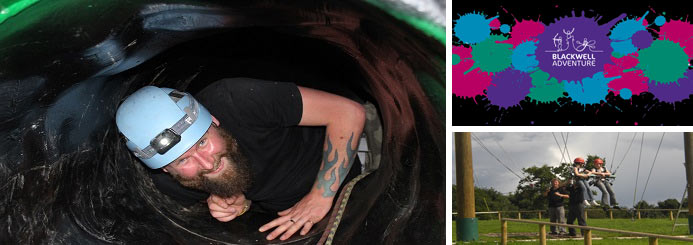
Outdoor Activity Instructor
As an Instructor you will deliver exciting and fun activity sessions to our guests, who range from Schools, Scouts and Guides and some adult groups.  Details & Apply..
Details & Apply..
If you are after a jobs that requires you to teach people how to climb, either indoors on a purpose built climbing wall, or outside on crags, or if you want to lead groups of walkers, especially in a mountain environment, you need to get qualified with one or more of the main British Mountaineering Council qualifications.

As an Instructor you will deliver exciting and fun activity sessions to our guests, who range from Schools, Scouts and Guides and some adult groups.  Details & Apply..
Details & Apply..



Do you have a passion for adventure? Would you like a career that you love? Become an outdoor instructor with one of the industry's leading outdoor adventure providers on Mendip Activity Centre's 18-week Accelerated Outdoor Instructor Training course.
 Details & Apply..
Details & Apply..



Mendip is looking for motivated, passionate and brilliant instructor to take on a year round role at Mendip Activity Centre and help us on our mission, the Mendip Way.  Details & Apply..
Details & Apply..

As an Instructor you will deliver exciting and fun activity sessions to our guests, who range from Schools, Scouts and Guides and some adult groups.  Details & Apply..
Details & Apply..



Do you have a passion for adventure? Would you like a career that you love? Become an outdoor instructor with one of the industry's leading outdoor adventure providers on Mendip Activity Centre's 18-week Accelerated Outdoor Instructor Training course.
 Details & Apply..
Details & Apply..
Let's start with indoors on the climbing wall. It doesn't matter whether the wall is twenty feet high with a couple of routes, or whether it is a monster like the Edinburgh International Climbing Arena, you need the Climbing Wall Award (CWA) or the older Single Pitch Award (SPA) as a minimum. Once you hold one of these you can take the Climbing Wall Leading Award (CWLA) which builds on your existing knowledge and allows you to teach lead climbing skills.
To qualify for the basic awards you will need to demonstrate knowledge of climbing venues and rope management. You will also need to show you can manage groups, teach climbing skills and undertake emergency procedures. The course itself usually lasts a couple of days and you will learn a great deal from it. You should also make sure your first aid certificate is up to date, as you will need this as part of the course assessment.
You may also be interested in the Walking Group Leader Award (WGL) which allows you to take groups of walkers in terrain that is upland, fells and moors. The North York Moors would be a good example. Slightly more challenging is the Mountain Leader Award (ML) and the Winter Mountain Leader Award (MLW) which is also designed for those leading hill walking groups, though in tougher mountain terrain, without ropes. And a step further would be the Mountaineering Instructor Award (MIA) and the Mountain Instructors Certificate (MIC). These two allow you to lead groups in more challenging conditions and environments. They will broaden your experience and improve your job prospects if you are aiming to teach at a level beyond basic climbing.
So once you are qualified to teach, what can you expect from a climbing instructor job? The main job requirements are going to mirror the information you learnt during the Single Pitch Award, namely being able to provide direct instruction to groups on various aspects of climbing. You'll be responsible for the health and safety of the people you are teaching. There will probably also be some paperwork involved.
Teaching climbing, you can expect to earn anywhere up to £300 per week for basic instruction. Once fully qualified, you can earn up to £12 per hour. If you are working at an activity centre, do take into account that your accommodation and food may be subsidised, so although the wage may be lower, so are your outgoings.
We spoke to Adam about his experiences as a Climbing Instructor in West Wales.
"I have been mad keen on climbing for years now. I went on an activity holiday in the Peak District as a kid and being allowed to climb all over these rocks without my Mum shouting at me to get down was fantastic. It all grew from there really. I found a local climbing wall and went there a lot to improve my skills. The staff there were really helpful and when I asked them about how to get more involved, they said I should do the single pitch award or the climbing wall award."
"I took that and started applying for jobs. There weren’t loads of jobs available so I did some more courses at college and I think it was that that helped me get my first job. I was an assistant climbing instructor with an outdoor pursuits centre in the Lake District. I imagined myself somewhere like Wales or Scotland to be honest I thought the Lake District would be a bit flat. I was wrong. There is some of the best climbing in the country. It was ace being able to climb in my free time, and climb while I was at work too. Teaching groups of kids from the city who had probably never seen a mountain before is so rewarding. Making sure they are aware of all the safety procedures and how dangerous it can be, then getting them out on the rock. Teaching people to climb is the best job in the world!"
"Recently I moved to a new company in Wales and I have started to take my mountain leader award so that I can take groups out away from the purpose built wall at the centre."